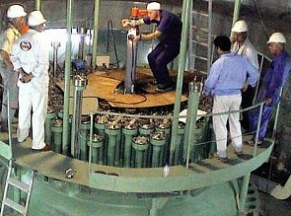|
World Jewish News

Iran nuclear plant in Bushehr. Technicians measuring parts of Iran's Bushehr nuclear power plant in this undated photo. Photo by: AP
|
Iran says ready to talk as EU approves new nuclear sanctions
26.07.2010, Israel and the World Iran is ready to return to negotiations on a nuclear fuel swap without conditions, its envoy to the International Atomic Energy Agency (IAEA) said on Monday, the official IRNA news agency reported.
Talking of a letter that Iran handed to the IAEA about the proposed nuclear fuel swap, Iran's envoy to U.N. agency, Ali Asghar Soltanieh said:
"The clear message of this letter was Iran's complete readiness to hold negotiations over the fuel for the Tehran reactor without any conditions."
International concerns about Iran's uranium enrichment program have led to a tightening of economic sanctions against the Islamic Republic. The European Union on Monday formally adopted a package of new sanctions against Iran, targeting the country's foreign trade, banking and energy sectors.
The move, which EU leaders had been agreed to in principle in June, is the latest in a series of measures taken by the international community in an effort to halt Iran's nuclear program.
In Tehran, Iranian Foreign Ministry spokesman Ramin Mehmanparast denounced the EU decision.
"Moving toward confrontational measures and supporting unilateral actions and damaging the atmosphere are not considered by us to be a good use of the opportunity," Mehmanparast said, according to the state television network's website.
In Brussels, EU foreign ministers adopted a decision on a package of restrictive measures in the areas of trade, financial services, energy and transport, said a diplomat who spoke on condition of anonymity under standing rules.
Israel, meanwhile, lauded the move: "We welcome any diplomatic process that can cause Iran to reconsider its intention to acquire a nuclear capability," said Deputy Defense Minister Matan Vilnai.
The new measures will come into force in the next few weeks, after they are published in the bloc's official gazette, officials said.
"We have a comprehensive set of sanctions. This is something where we have all 27 countries working together," EU foreign policy chief Catherine Ashton said ahead of the meeting.
According to the decision reached in June, the sanctions will target dual-use items that could be used as part of a nuclear program, and Iran's oil and gas industry - including the prohibition of new investment, technical assistance and transfers of technologies.
Iran's shipping and air cargo companies will be blacklisted and banned from operating in EU territory, and new visa bans and asset freezes will be imposed on Iran's Revolutionary Guard. The sanctions also encompass trade insurance and financial transactions.
EU exports to Iran - mainly machinery, transport equipment and chemicals - amounted to euro 14.1 billion in 2008.
Imports from Iran, the EU's sixth largest energy provider, amounted to euro 11.3 billion, with energy being 90 percent of the total.
The new European restrictions will come on top of a fourth round of sanctions imposed last month by the UN Security Council to curtail Iran's nuclear program over fears it is developing weapons. The council endorsed those sanctions after Iran rebuffed a plan to suspend uranium enrichment and swap its stockpiles of low-enriched uranium for fuel rods.
The new restrictions are similar to measures adopted by the Obama administration, which has imposed penalties against additional individuals and institutions it says are helping Iran develop its nuclear and missile programs, and evade international sanctions.
Iran denies that it is working on a nuclear weapon, saying its program is intended solely for peaceful purposes such as energy-generation, and that it has the right to enrich uranium under the international nonproliferation treaty.
EU foreign ministers also are expected reaffirm the bloc's invitation to Tehran to hold talks on the issue.
"Our aim is to bring Iran back to the negotiating table," said German State Secretary Werner Hoyer. "We're offering our hand, and all they have to do is to take it."
Iran has sought to deflect pressure and further sanctions by displaying a willingness to talk about nuclear issues - a line reinforced Monday by Ali Ashgar Soltanieh, Tehran's senior envoy to the International Atomic Energy Agency.
"Iran is ready to go back to the negotiating table quickly to discuss exchanging some of its enriched uranium for fuel rods for Tehran's nuclear reactor," Soltanieh told reporters in Vienna.
He spoke after presenting revised proposals on a possible swap to IAEA chief Yukiya Amano, who was expected to relay them to the U.S., France and Russia - the three nations engaged with Iran in such an exchange.
No details of the latest offer were available. But under a similar deal in May with Brazil and Turkey, Iran agreed to ship 1,200 kilograms (2,640 pounds) of low-enriched uranium to Turkey, where it would be stored. In exchange, Iran would get fuel rods made from 20 percent enriched uranium. That level of enrichment is high enough for use in research reactors but too low for nuclear weapons.
Haaretz.com
|
|
